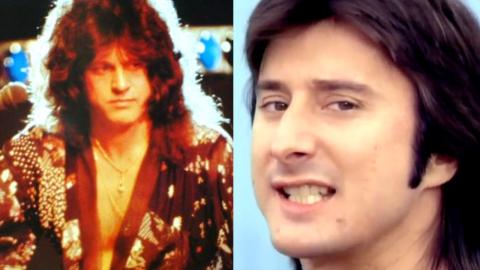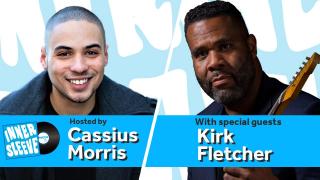Top 10 Bands That Became More Successful with a New Singer

Sometimes, change can be a good thing. Welcome to WatchMojo.com, and today we're counting down our picks for the Top 10 Bands That Became More Successful with a New Singer. For this list, we'll be ranking the bands whose career received a commercially successful boost after obtaining a new singer.
Special thanks to our users Sleep Stranger for submitting the idea using our interactive suggestion tool at http://www.WatchMojo.comsuggest
Script written by George Pacheco
#10: Phil Anselmo replaces Terry Glaze
Pantera
Interview with Machine Head's Phil Demmel About Unto the Locust
Fans new to the history of this rough 'n ready metal act may be surprised to discover that Pantera actually started their career asa more traditional-minded, glam-flavoured metal machine. The Texas-bred band featured Terry Glaze on vocals during this time, and released three albums with the singer before eventually hooking up with New Orleans native Phil Anselmo on the Power Metal album. It wasn't long after bringing on Anselmo that Pantera would sign a deal with AtCo Records, resulting in their breakthrough major label debut, Cowboys From Hell. The rest, as they say, is history, with Pantera eventually going on to become one of heavy metal's most popular and influential bands.
#9: Henry Rollins takes over from Dez Cadena
Black Flag
Hardcore punk icons Black Flag have been through a number of lead vocalists over the years, including Ron "Chavo" Reyes and former Circle Jerks singer Keith Morris. But it was with the magnetic and furious frontman Henry Rollins, however, where the band arguably entered their most progressive and successful creative period. Rollins served as the longest-termed singer for Black Flag, having replaced Dez Cadena in 1981, with the latter switching over to the second guitar position. The resulting albums with Rollins, such as Damaged, My War and Slip It In, went on to influence not only Flag's punk rock community, but also metal and noise-rock bands around the world.
#8: Ian Gillan replaces Rod Evans
Deep Purple
Top 10 Musicians with Multiple Successful Bands
The British rock institution known as Deep Purple did get a solid running start with their Mark I lineup alongside their first frontman Rod Evans, but it wasn't until Ian Gillan joined the band in late 1969 that they truly start their journey towards superstardom. This was largely in part to Gillan's capable ability to howl with reckless abandon on such future Purple classics as "Highway Star" and "Space Truckin,' both of which served as the earliest examples of hard rock progressing towards heavy metal. Purple and Gillan would go on to crisscross the world on tour, further cementing their status as one of heavy rock's most influential groups.
#7: Steve Perry takes over from Gregg Rolie
Journey
Innersleeve 100 Year In Review with Steve Vai, Daniel Lanois, Tobias Forge, Anthony Vincent
The crystal clear voice of Steve Perry is the one most closely associated with the career of rock legends Journey, but the band's story actually started much earlier. Band leader Neal Schon initially formed Journey after leaving Santana in 1973, coming together with Greg Rolie on keyboards and vocals. Journey briefly employed singer Robert Fleischman after releasing their third album in 1977, but it was the Steve Perry era from 77’ to 98’, which served as their most commercially successful, resulting in numerous top ten singles and successful world tours.
#6: Lindsey Buckingham and Stevie Nicks replace Bob Welch
RIP Aaron Carter | Reacting to the Rock & Roll Hall Of Fame 2022 | Lindsey Sterling Interview
It's quite difficult to make sense of the twisted mass of tangled threads which is Fleetwood Mac lineup changes. What isn't difficult, however, is to note how the band's commercial profile increased in 1974, when the former blues-rock band enlistedsinger/songwriter couple Lindsey Buckingham and Stevie Nicks into their ranks. Buckingham and Nicks brought with them astripped down, emotional passion to the band's songwriting, in the process tempering down Fleetwood Mac's riff-heavy sound into one more balanced between Buckingham's flowing guitar melodies and Nicks’ charismatic vocals and stage presence.
#5: Simon Le Bon replaces Stephen Duffy
Duran Duran
The tenure of one Stephen Duffy was not one which lasted long within an early incarnation of the British pop/rock goliath known as Duran Duran. Although Duffy helped form the band alongside bassist John Taylor and keyboardist Nick Rhodes he was ultimately one of a small revolving door of vocalists which assisted Duran Duran during their early nightclub days. It was with the addition of Simon Le Bon in 1980 which cemented what most fans see as the "definitive" lineup of the band as this version of Duran Duran would go on to become legitimate 1980s superstars, thanks to music videos for "Rio," "Save a Prayer" and "Hungry Like the Wolf" receiving massive MTV rotation.
#4: Phil Collins replaces Peter Gabriel
Genesis
Machine Head's Phil Demmel Talks
Genesis were responsible for spearheading the progressive rock movement in the 1970s, thanks much in part to the magnetic stage presence of their theatrical frontman Peter Gabriel. Early Genesis shows were marked by Gabriel's penchant for stage makeup and showmanship, while the band's complex songwriting exemplified prog rock's reputation for musical intricacy. Fast forwarding to the band's tenure under singer/drummer Phil Collins, however showcased a band very much taking this progressive musicality and stripping it down to its most essential, commercial elements. Smash Genesis hits like "Land of Confusion" and "That's All" all took the band's early elements and combined them with smart songwriting, resulting in the band's most commercially successful period.
#3: Brian Johnson replaces Bon Scott
AC/DC
Most AC/DC fans will likely agree that the band's iconic frontman Bon Scott was irreplaceable. That is...until they heard Brian Johnson. It was Johnson's debut with AC/DC in 1980 which assisted in softening the blow struck by Scott's alcohol-related death earlier that year, a magnificent riff-rock collection known as Back in Black. Johnson's paint-peeling screech was one patterned after Scott's own legendary wail, yet the former Geordie frontman never made it a point of copying Scott note for note. Rather, the band and Johnson paved their own way together, writing, recording and touring together for the next thirty-plus years.
#2: Bruce Dickinson replaces Paul Di'Anno
Iron Maiden
Marilyn Manson Sentenced To Community Service | Paul Jones vs. Jack Bruce | Blaze Bayley Interview
Many members have passed through the hallowed halls of metal masters Iron Maiden over the years, but it's the coveted lead vocal position which has served as the most hotly debated among fans. Iron Maiden were diehard fan favorites in their native England, after toiling through the underground with their punk fueled frontman Paul Di'Anno. Drug issues took their toll on the frontman after two albums with Maiden, however, resulting in him being replaced in 1981 by former Samson singer Bruce Dickinson. The resulting albums with Dickinson would cement Iron Maiden as a worldwide metal powerhouse, increasing the band's commercial profile around the world.
Before we reveal our number one lineup change, here are a few honorable mentions!
Mike Patton replaces Chuck Mosely
Faith No More
James LaBrie replaces Charlie Dominici
Dream Theater
#1: David Gilmour replaces Syd Barrett
Pink Floyd
Innersleeve #25 Kirk Fletcher Interview | Global Blues Festivals | David Lee Roth | Derek Orsi
The heavy psychedelic sound which characterized early Pink Floyd was thanks largely in part to the band's founder, guitarist Syd Barrett. It was the songwriter's erratic personal behavior, exacerbated by heavy drug use, which would eventually lead to Barrett's dismissal from Pink Floyd. Vocalist and guitarist David Gilmour had already been introduced into the band at this point to support and supplement Barrett, but it was this shift in creative control with Syd's exit which led to some of Floyd's most commercially successful records. Gilmour's smooth vocals and expressive, emotional guitar playing would go on to define the "new" Pink Floyd sound, bringing in fans around the world throughout the 70s, 80s and 90s.
Do you agree with our list? Which band's lineup change do you feel deserves some recognition? For more enlightening top ten lists, published every day, please subscribe to WatchMojo.com!








